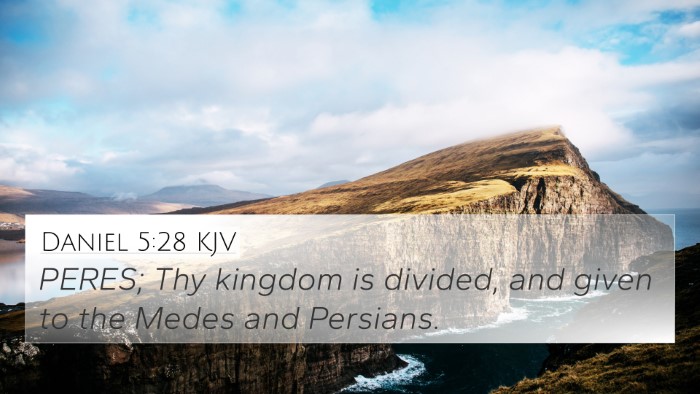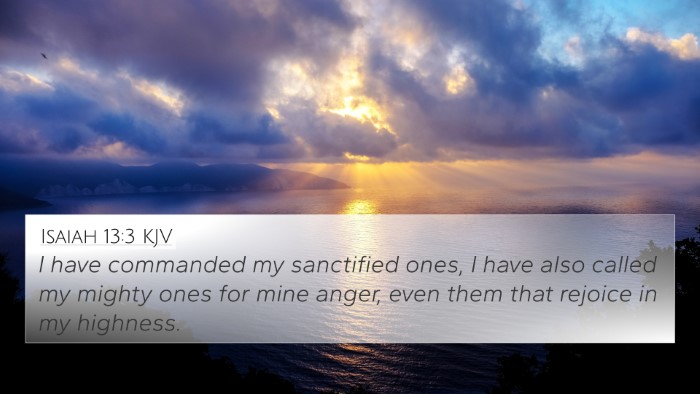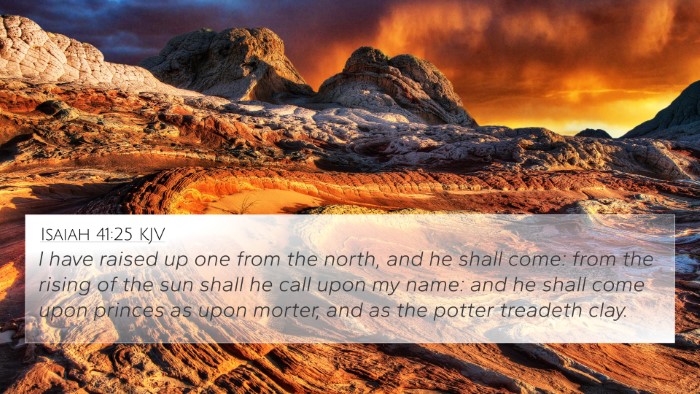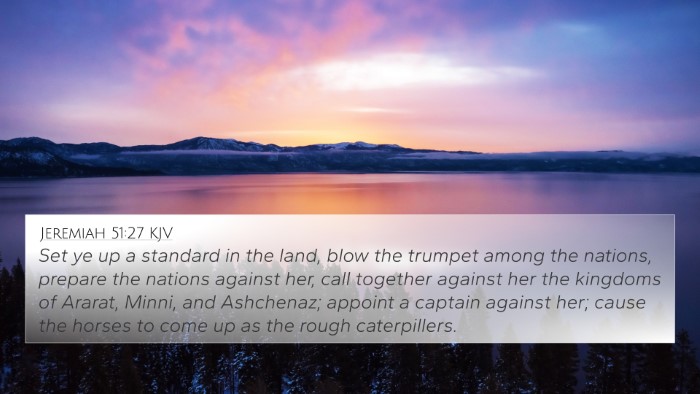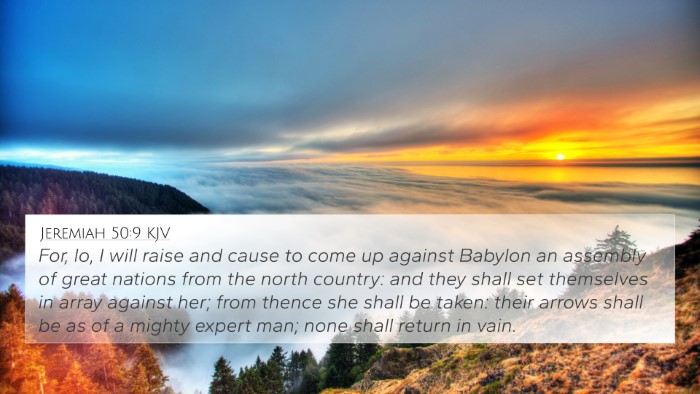Understanding Isaiah 13:17
Isaiah 13:17 states: “Behold, I will stir up the Medes against them, which shall not regard silver; and as for gold, they shall not delight in it.” This verse is part of a prophecy regarding the fall of Babylon, highlighting the impending judgment and destruction that would come upon the city through the Medes.
Overall Context
The context of Isaiah 13 involves a direct prophetic warning by Isaiah concerning the fate of Babylon, symbolizing the pride and arrogance of nations opposing God. This chapter emphasizes God’s sovereignty in using one nation to bring destruction upon another, portraying a significant theme of divine judgment found throughout scripture.
Key Insights
- God’s Sovereignty: Both Matthew Henry and Adam Clarke emphasize that God orchestrates the rise and fall of nations. Babylon’s pride leads to its downfall, driven by the Medes—who are depicted as a fierce and unstoppable force.
- Indifference to Wealth: The phrase “shall not regard silver” reflects a deeper spiritual truth about the insufficiency of wealth in the face of divine judgment. Albert Barnes discusses how the Medes' indifference to gold and silver symbolizes a greater spiritual detachment from the material and a focus on their mission.
- Historical Fulfillment: The fall of Babylon to the Medes, as prophesied, occurred in 539 BC, illustrating the precision of prophetic scripture and God's ability to fulfill His word through historical events.
Bible Cross-References
To fully grasp the implications of Isaiah 13:17, we can look at several cross-referenced Bible verses:
- Jeremiah 51:11: "Make bright the arrows; gather the shields: the LORD hath raised up the spirit of the kings of the Medes: for his device is against Babylon, to destroy it." This verse confirms God's use of the Medes as an instrument of judgment against Babylon.
- Isaiah 21:2: "A grievous vision is declared unto me; the treacherous dealer dealeth treacherously, and the spoiler spoileth." This reference aligns with the theme of betrayal and destruction associated with Babylon's fate.
- Isaiah 47:15: "Thus shall they be unto thee with whom thou hast labored, even thy merchants, from thy youth: they shall wander every one to his quarter; none shall save thee." This highlights the collapse of support for Babylon in its time of need.
- Revelation 18:2: "And he cried mightily with a strong voice, saying, Babylon the great is fallen, is fallen, and is become the habitation of devils." This New Testament reference connects to Babylon’s downfall and the themes of judgment present in Isaiah.
- Micah 5:6: "And they shall waste the land of Assyria with the sword, and the land of Nimrod in the entrances thereof: thus shall he deliver us from the Assyrian, when he cometh into our land, and when he treadeth within our borders." This emphasizes God's deliverance through judgment upon nations.
- Proverbs 11:4: "Riches profit not in the day of wrath: but righteousness delivereth from death." This reflects a spiritual principle that connects to Babylon's reliance on wealth at the time of judgment.
- 2 Chronicles 36:20-21: "And them that had escaped from the sword carried he away to Babylon; where they were servants to him and his sons until the reign of the kingdom of Persia: to fulfill the word of the LORD by the mouth of Jeremiah..." This historical reference reveals God’s plan and the fulfillment of prophetic words.
Thematic Connections
The themes present in Isaiah 13:17 can be connected to broader theological discussions on:
- Divine Judgment: The entire prophetic literature of the Old Testament serves as a testimony to God’s control over human affairs and nations.
- Material Indifference: The notion that earthly treasures do not matter in the face of God's judgment is echoed throughout scripture, encouraging believers to focus on spiritual richness.
- Historical Prophecy: The fulfillment of prophecy underlines the reliability of Scripture, further validated through inter-Biblical dialogue and connections.
Conclusion
Isaiah 13:17 stands as a poignant reminder of God's sovereignty and the inevitable consequences of national pride and sin. Through the insights of respected commentaries and the cross-referencing of biblical texts, we can draw rich connections that enhance our understanding of divine justice throughout the Scriptures.
Tools for Further Study
For those looking to implement cross-referencing in their Bible study, consider using:
- Bible concordance: A useful tool for locating specific words and themes in the scripture.
- Cross-reference Bible study guides: Structured materials can aid in systematic Bible study to uncover thematic connections.
- Bible reference resources: Various dictionaries and commentaries can provide deeper insights into the text.
How to Apply Cross-References
When studying passages like Isaiah 13:17, it is beneficial to:
- Identify key themes and explore their occurrences in other scriptures.
- Utilize a comprehensive Bible cross-reference system for deeper insights.
- Link passages thematically, exploring Old Testament prophecies with New Testament fulfillments.






